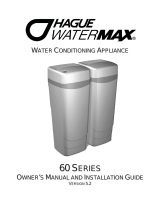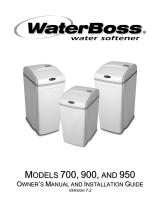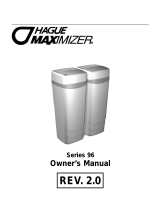Page is loading ...

FREQUENTLY ASKED
CONSUMER QUESTIONS
What are the advantages of using SureSoft
®
and
Nature’s Own
®
water softening products?
The advantages of using SureSoft or Nature’s Own
water softening products can be seen and felt in
many positive ways:
•
Softens water with all-natural, high-quality,
high-purity salt
•
Helps deliver pure, great tasting water
•
Helps appliances operate more effi
•
Helps protect pipes and appliances from
hard water scale
•
Helps soaps and detergents clean more
effectively
•
Helps prevent hard water spots
•
Helps keep clothes brighter and whiter
How do I decide between salt blocks, cubes,
pellets or extra coarse crystals?
No matter what their shape, all of our water
softener salts possess the same top quality and
value. So the choice of shape really comes down
to personal preference.
Salt comes in several different sizes and shapes.
•
Blocks
that can only be used in specially
designed tanks. For maximum brine formation,
blocks must always be submerged in water.
•
Cubes
are about 3/8” thick and vary in width
and length.
•
Pellets and pellens
are shaped like a cough
drop and can vary in thickness.
•
Extra coarse crystals
resemble over-sized
grains of table salt.
How do I know if I need a water softener salt
with an additive?
When it comes to water softener salts with
additives, there are two basic types: one that helps
with the removal of rust and one that helps keep a
system’s resin cleaner longer. So if you have rust in
your water, you would benefi from buying SureSoft
PelletsPlus with Rust Buster. If you want less system
maintenance, you would benefi from buying
SureSoft PelletsPlus with Resin Clean.
Should I choose potassium chloride or
sodium chloride?
Both sodium chloride and potassium chloride
soften water equally well. The main difference is
that potassium chloride contains no sodium. If
your customers want to (a) reduce the amount of
sodium, OR (b) increase the amount of potassium
in their diet, they should consider Nature’s Own
Potassium Cubes.
What is the difference between rock, solar
and evaporated salts?
There are three basic types of sodium chloride
salts that can be used with water softeners. While
solubility does not vary between the three types,
the amount of insoluble matter, or purity, does vary.
•
Rock salt
is obtained by the traditional mining of
underground salt deposits. Rock salt is typically
the most economical choice for water softeners.
Unless optically-sorted, which will reduce the
level of insoluble matter in the rock salt, it usually
contains higher levels of impurities that eventually
settle at the bottom of the brine tank. Rock salt is
most commonly sold in crystal form.
•
Solar salts
are obtained mainly through
evaporation of seawater or inland brine resources,
which are more pure and have considerably
less insoluble matter than rock salt. Though
most commonly sold in a crystal form, it is also
available in compressed pellets, cubes and blocks.
•
Evaporated salts
are obtained from underground
deposits with a solution-mining process; moisture
is then evaporated using natural gas or coal.
Evaporated salts are the purest and contain the
least amount of insoluble matter of the three
types. They may also be the most expensive. On
the other hand, they are the most convenient
because they leave less sediment, which means
less softener cleaning. They are available in
compacted pellets, cubes and blocks.
Whether the salt type is rock, solar or evaporated,
they all deliver the same performance. The high-
quality salt offered by SureSoft may contain
optically-sorted rock, solar or evaporated salt,
depending on the region. Whatever the source of
the salt, you can be assured that SureSoft provides
100% natural, high-quality salt for your water
softening needs.
/




